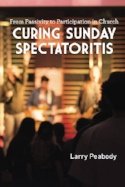Watch Your Language (Part One)
(This is the first in a series on how “church-speak” can thwart shared church.)
Of all people, we Christians should know that words matter. By his words God created the universe and keeps it going. Through words, God has revealed himself to us—via the Living Word and the written words of Scripture. So it should come as no surprise that practicing shared church depends heavily on our using right words in the right way.
Changing the Church Vocabulary
Not long ago, I attended a gathering of those involved in faith-at-work ministries in our area. The event was held in Seattle Pacific University. Our speaker: Tom Nelson, author of Work Matters: Connecting Sunday Worship to Monday Work, serves as senior pastor of Christ Community Church in Leawood, KS. He told us the story of how he—after realizing the importance of equipping Christians for their weekday work—helped his church incorporate the theology of work into their Sunday gatherings.
After speaking, he opened an opportunity for questions. One person asked what he saw as the most important element in the transition. Nelson responded instantly: vocabulary. The church had to learn how to stop using certain terms and begin using other words. Like the forms construction workers use in pouring concrete, words shape our thoughts. These, in turn, harden into traditions that become nearly unbreakable.
Just a short time later, someone stood to ask another question. The man began by saying, “I’m just a layperson, but I wondered about . . . .” Before he could even finish his sentence, Nelson cut in. You have just illustrated my point about vocabulary, he said. In Christ Community Church, the habit of referring to Christians as “laypersons” had to be unlearned. Nelson was helping those in his church to carry out something Karl Barth had written years ago: “The term 'laity' is one of the worst in the vocabulary of religion and ought to be banished from the Christian conversation.”
What Difference Does It Make?
But wait, you may be thinking, what’s so wrong with being a layperson? After all, our Christian parents, grandparents, and great-grandparents all saw themselves as laypeople. True. The word "laity" has been with us for a long time--but not long enough. Let’s look at a few reasons we should purge the term from our vocabulary.
First, the Bible never uses the word to describe Christ-followers. “We can look in vain for the term ‘lay’ in the New Testament. The laity is an unknown species in the texts of the gospel,” says Alexandre Faivre in The Emergence of the Laity in the Early Church. “There was still no distinction between clergy and laity at the time of the pastorals [I & II Timothy and Titus].” By the third century, Faivre says, “The layman was quite certainly regarded as inferior to the clergy at that time.”
Second, when it comes to the body of Christ, such language is a put-down. Eugene Peterson has said, “Within the Christian community, there are few words that are more disabling than ‘layperson’ and ‘laity.’” That disability surfaced in the words of a blogger: “I’m just a layperson, looking in from the sidelines.” Another said, “I wouldn’t know, since I’m just a layperson.”
Third, the whole setup that labels some believers “laypersons” and others as “clergy” works powerfully against our practicing shared church. The terms reinforce a religious caste system that creates professionals and amateurs, an elite and a subclass. Sunday gatherings make this two-tiered arrangement plain for all to see. The few talk and do. The many listen and watch.
A Church Without Clergy or Laity
What a contrast to the action-packed words the New Testament uses to identify Christ-followers. For example, we—all of us—are:
- Members of Christ’s body, each with gifts to be used to help everyone.
- Priests who speak to, instruct, strengthen, and build up one another.
- Branches of the Vine who bear his nourishing, refreshing fruit for the benefit of all.
That’s why, in describing what the Corinthian believers were to do when they gathered, Paul wrote: “When you meet together, one will sing, another will teach, another will tell some special revelation God has given, one will speak in tongues, and another will interpret what is said. But everything that is done must strengthen all of you” (I Cor. 14:26, NLT). No “clergy.” No “laity.” Leaders, yes, but no superstars. Simply brothers and sisters in Christ.
How can you help do away with the “clergy/laity” vocabulary? Tactfully encourage your church leaders to set the example in their teaching and speaking. As Tom Nelson writes in Work Matters, “Our local church preaching team is vigilant in avoiding dichotomous or reductionistic words and phrases such as ‘a secular job,’ ‘sacred space,’ ‘full-time ministry,’ ‘frontlines ministry,’ or ‘moving from success to significance. . . . All too often our theology says one thing and our language communicates another.”


